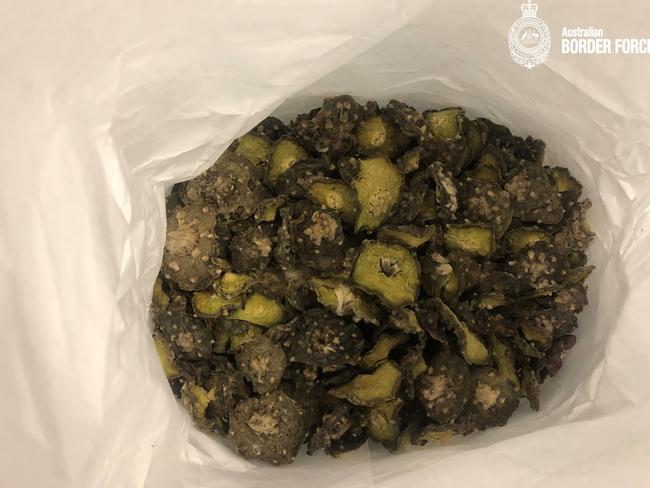Man caught with hallucinogenic plant in luggage at Sydney Airport by Australian Border Force
It was not the usual contraband detected by Australian Border Force officers but this pony-tailed man appeared stunned when 500g of potent hallucinogenic cactus was found in his luggage at Sydney Airport.
It was not the usual contraband detected by Australian Border Force officers but this pony-tailed man appeared stunned when 500g of potent hallucinogenic cactus was found in his luggage at Sydney Airport.
The 64-year-old, who had arrived on a flight from Los Angeles, was detected by officers who acted on a tip received through a Border Watch referral about the psychoactive “peyote’’.
He claimed the 500g of the narcotic plant wrapped in white paper and found buried at the bottom of his checked-in suitcase last month were for his Native American ceremonial requirements.
Peyote is currently in growing season in parts of southwest America, such as Colorado, Arizona, Utah as well as in northern Mexico.

MORE NEWS
Alan Jones goes to war as 2GB offer cuts salary in half
Missing persons unit shut down after failing to solve cases
Baby sling had warning against use in babies under four months
President of the Australian Drug Law Reform Foundation doctor Dr Alex Wodak said its use in Australia has been typically low but difficult to detect.
Peyote, a small, spineless cactus, contains the psychoactive alkaloid mescaline.
“Its popularity in the US is restricted and confined to the south west where it grows wild,’’ Dr Wodak said.
“If its popularity is increasing in Australia, it’s difficult to tell. Its popularity in the US is restricted and confined to the south west where it grows wild. Mescaline taken in large quantities can be toxic. It’s possible the man caught bringing in the cactus buttons wanted to cultivate them to make money down the line.”
Peyote is traditionally used by the Native American Church in religious ceremonies and in shamanic contexts.

Likened to LSD, mescaline purportedly “profoundly alters perception of self and reality’’.
In North East Mexico and South Texas the dried cactus buttons have created a whirlwind of well-documented drug tourism with a shaman often guiding groups through special peyote songs as they ingest the plant and hallucinate for up to 12 hours.
Users of the substance say bouts of violent vomiting occur before they experience a range of emotions.

ABF Superintendent Phillip Anderson said the prohibited haul was an important detection that highlighted the role the community can play in protecting Australia’s border.
“Our airport officers work incredibly hard every day to protect Australia’s community from dangerous illicit substances such as these,” Supt Anderson said.
“The information that led to this detection came from a member of the public who reported the suspected criminal activity through Border Watch.”
The man was cautioned with regard to possible importation offences.
In Australia, peyote is illegal in Western Australia, Queensland, and the Northern Territory, but legal to grow, except for use, in Victoria and New South Wales.


